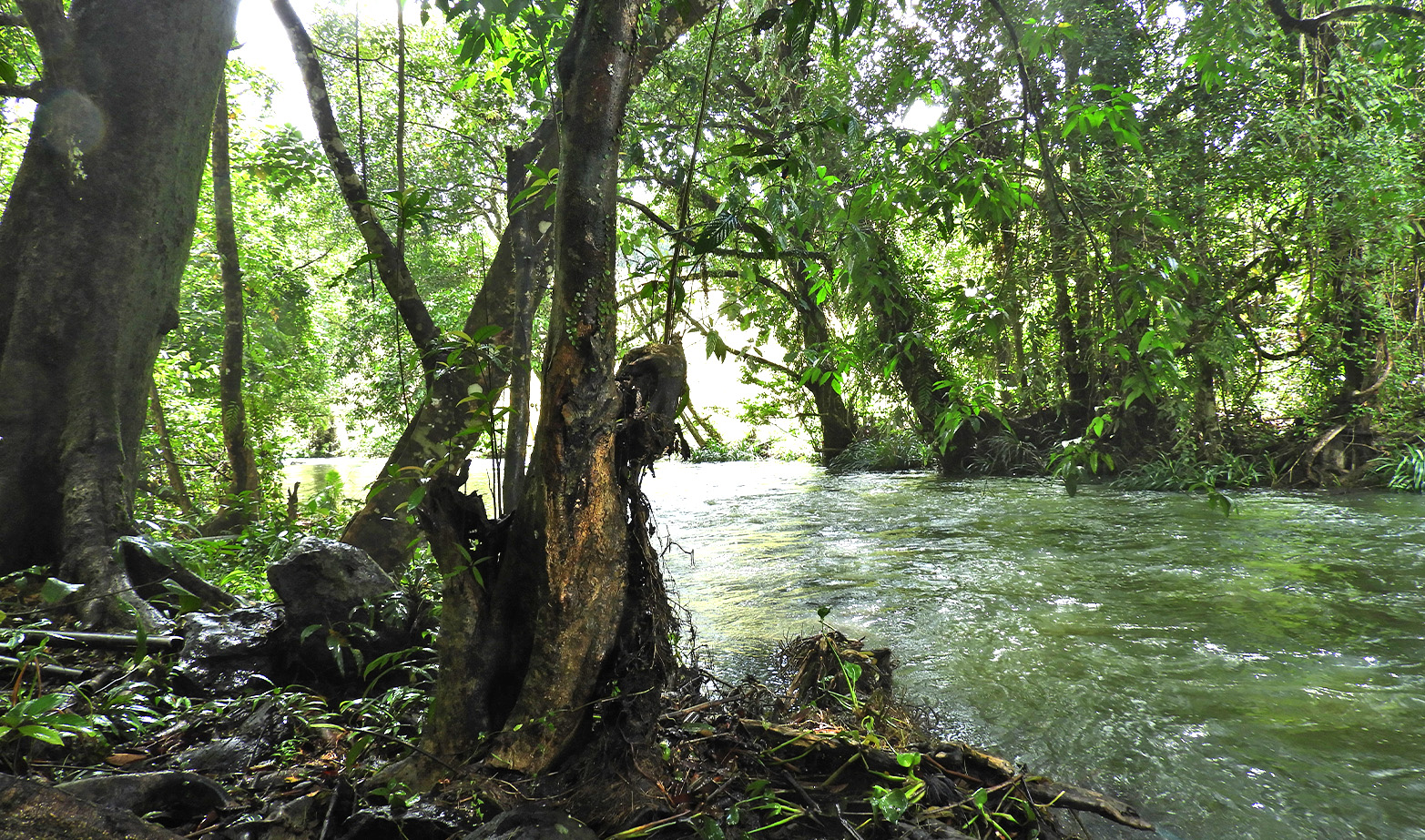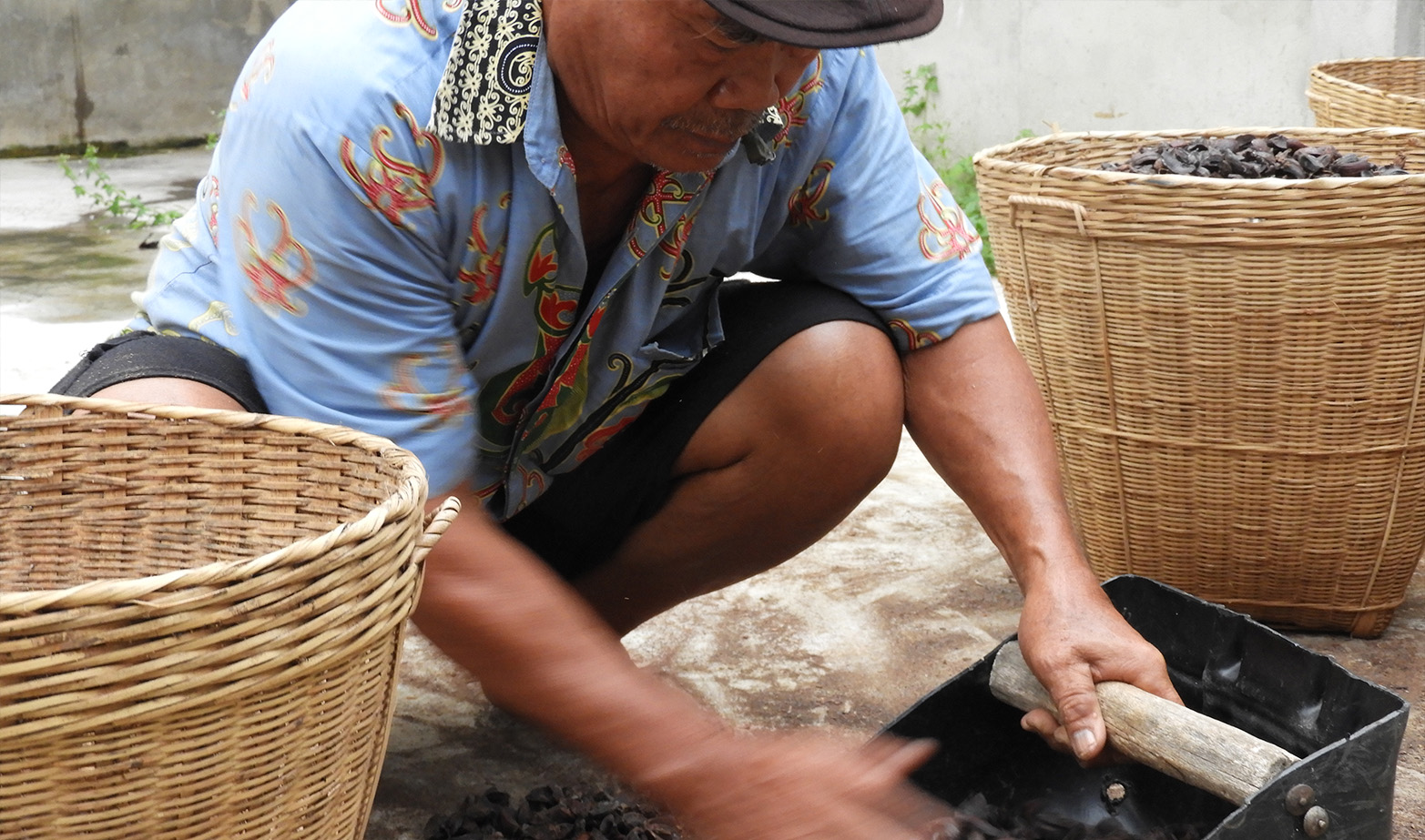
River, Desa Sahan. The Pangajid-Pikul customary forest protects the catchment of two rivers which have several dramatic waterfalls. A small tourism business has developed, with a youth group providing guides, parking and facilities for tourists from the local town. (P.Wood/Samdhana)
- admin
- 26 September 2025
- Analysis
A customary forest finds a new way to generate value
The Pikul-Pengajid customary forest covers 100 hectares in the village of Sahan, Bengkayang district, West Kalimantan. The forest has survived thanks to the resistance of local people, for whom it holds deep traditional and spiritual meaning, against logging and oil palm companies, illegal logging operations, and encroachment by small-scale farmers, loggers and gold miners. As a result, it still has huge trees, dense tangles of rattan, and a rich diversity of plant species. The efforts of the community have been supported through the legal recognition of the customary forest by the district head (2002) and the Minister of Environment and Forestry (2018).
While strong local leadership and government support have protected the forest so far, forests in neighbouring villages are being degraded by illegal mining, timber cutting or clearance for farming. The future of the Pikul-Pengajid forest depends on the continued commitment of the community – and that commitment will be stronger if the community continues to regard the forest as an asset.
The Sahan village community and the Bengkayang district Forest Management Unit (kesatuan pengelolaan hutan, KPH) have identified an opportunity to increase the income that local households receive from the forest, while protecting it: the production of certified tree seedlings for sale to companies and government agencies.
This novel approach focuses on the tengkawang tree (shorea species) because it has strong cultural associations for the Dayak people, and has many local uses. In the past, villagers collected nuts and sold them to middle-men for export. However, this low-value market collapsed after Indonesia passed laws requiring in-country product processing. Currently, tengkawang seeds are mostly left in the forest. With no large mammals or birds to spread the seeds, the tengkawang saplings sprout under the forest canopy, with only a few growing into a full-sized tree.

The potential demand for certified tree seedlings is significant. In West Kalimantan, oil palm companies are required to retain seven percent of their concession under forest cover. If the existing forest cover does not meet this threshold, they are required to restore forest on part of their land, creating a need for native seedlings which are adapted to the local climate and environment. Another market is for commercial and urban development projects, where tree seedlings are needed for urban parks and forests. In 2023, the developer of Indonesia’s new capital city in East Kalimantan purchased seedlings from Sahan village. Furthermore, the KPH has three large tree nurseries of its own which require a supply of seedlings, and the government’s water catchment management agencies (BPDAS) need seedlings for their land restoration projects.
For these potential buyers, it is important that the source of seeds and seedlings is certified. In 2023, the Bengkayang KPH arranged for officials from the Ministry of Environment and Forestry’s Forest Seed Agency (Balai Benih Hutan) to visit the village and analyse the seedlings from the forest. As a result, the Pikul-Pengajid forest is the first – and currently the only – source of officially approved tengkawang seedlings.
To ensure that this new approach maximises the value of the forest as an asset, local people need to be the main actors in the proposed seedling business. The model is being discussed, but might involve interested individuals developing backyard nurseries, a shared community nursery, or a combination of the two. The government may act as a buyer initially, to establish the business, but in the long-term, the plan is for it to facilitate direct contact between the villagers and the buyers. A model community tree nursery already exists in the form of a small nursery started as part of the tengkawang butter project.
The KPH and the Sahan community are not alone in spotting the commercial potential of seedlings from the forest – but not all business models would place the community at the centre of the enterprise. A forestry company has approached the community leaders and the KPH, proposing a contract which gives the company a monopoly on seed collection from the customary forest for an undisclosed period and price. The offer suggests the company underestimated the community’s understanding of the value of the product. Fortunately, the Sahan community has access to advice through long-standing relationships with a civil society organization (CSO) and the government. However, the case highlights the need for all communities to have access to trusted sources of advice to help them make informed decisions when faced with such offers.
Improving value chains for forest products is often proposed as a way to give forests greater economic value for local people. However, this can be difficult to implement, especially in forest-edge communities, which are often far from markets and lack technical and financial resources[1].
The tengkawang seedling business is still in its early stages, but it shows promise for several reasons. It takes advantage of an under-used resource, the tengkawang seeds, which are readily available, close to the village, and easy to collect. It builds on the community’s existing practice of collecting tengkawang for household use and leverages horticultural skills that already exist within the village. Moreover, the business model is flexible. Individual households can adjust their level of involvement to fit around the demands of the farming calendar, and the sale of seedlings can be timed to provide income at times of need.
[1] See the story of the Sahan communities efforts to rejuvenate the Ilipi nut business